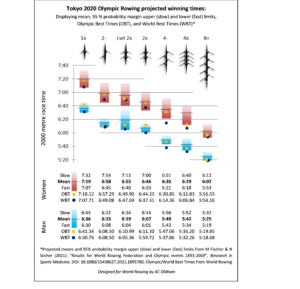
01 Jul 2021
Predicting Gold: How fast will rowers go at the Tokyo Olympics
Predicting winning times in rowing is not easy. The water conditions and temperatures can throw off the best calculations. Despite this, research has been completed into the long-term trends of how fast rowers can go.
Reviewing over a Century of race results, two Danish researchers have predicted winning times for the seven women’s and seven men’s events at the Tokyo Olympics.
Tokyo times
“By our estimates, the mean winning time for men’s events collectively will be just over 6 minutes, and women’s events will be around 6 minutes and 40 seconds, says Mads Fisher, a PhD candidate at the University of Copenhagen and lead author of Results for World Rowing Federation and Olympic events 1893-2019, published recently in the international journal Research in Sports Medicine.
“For the eights,” says Fischer as an example of the mean or likeliest results in Tokyo, “the predicted winning times are around 5 minutes and 25 seconds for men, and 6 minutes and 2 seconds for women.”
Besides projecting mean results, Fischer and his co-author Dr. Niels Secher, calculated upper and lower limits for what statisticians call the “95 per cent probability margin” in each event. In other words, their data give a 95 per cent chance that an Olympic final winning time will fall within a given fast-slow range.
Here are the study’s projections for all 14 Olympic events at a glance:

Trending faster
“The overall trends based on 556 men’s and 239 women’s events show about a 0.7 second improvement in racing times per year since 1893,” says Fischer, whose recent work builds on Secher’s 1973 paper titled Development and results in international rowing championships 1893-1971. In that work, published in the journal Medicine and Science in Sport, Secher noted that 2000m times were indeed getting faster in the then seven (at the time men’s only) Olympic events.
“I wanted to bring in the female side of things,” says Fischer of one motive in adding the next 50 years of data since the original study. “Historically, people have talked about the men’s races and the elite men’s team, but more and more we talk about elite women’s rowing in the same way. By presenting data for both we can make for better equality in sports.”
Significantly, the pace of improvement in men’s events has actually slowed since 1973. “The year’s average improvement is now 0.8 seconds faster per year, which is 0.3 seconds less than for the same five men’s events (2-, 4-, 8+, 1x, 2x) in Secher’s 1973 analysis,” says Fischer.
Despite this, all rowing events are still trending faster with no end immediately in sight. The key take-away, says Fischer is that “relative to the men’s events, the women’s events – being more recent additions to the World Championship and Olympic programmes – are set to gain even more speed.”
The Olympic difference
Fischer points to the women’s four, back in the Games after nearly three decades, as an event to watch closely. “Times will likely improve significantly now that it is an Olympic event.”
Read more about the women’s four returning to the Games here.
“Currently for the women, there is a full set of sweep events to compete in, which elevates the overall level in the women’s sweep events,” he adds. “There is no other event in rowing that matches the attention and the prestige that can be achieved in the Olympic Games.
“With everything being the same (water, weather, temperature) and only relying on the athletes and their equipment, the Olympic Games represents the top performance achievable for modern rowing. All of the fine details are thought through to gain even just 0.01% improvement on performance.”
World Best Times and future trends
While the Games Regatta and Olympic finals in particular can boast some of rowing’s most epic contests, race times are always at the mercy of weather conditions – hence rowing having World Best Times rather than World Records. That is why so few of World Rowing’s current list of top times were actually set at an Olympics, because there is just one chance every four years. There is just one set at the Olympics, the famous Kiwi Pair’s breath-taking performance at the London 2012 Games, and that was in the heats.
“The world best times are not necessarily in the finals,” says Fischer, who believes future research could look beyond just the winning final times used in his study. “The conditions needed to make a world’s best time can be any race.
“Rowing is still so unpredictable because of the dependence on weather. We are going to see improvement because coaching and training is still improving.”
Read more about Rowing’s World Best Times here.
Into the unknown
According to Fischer, two unusual factors in particular make predicting winning times at this year’s Games even more difficult.
“The Tokyo Rowing Course (Sea Forest Waterway) is salt water, which is usually fast water,” says Fischer. “The higher density of saltwater makes the racing shell float higher up. Less depth of the boat in the water equals less drag, and therefore faster racing.”
The other unknown quantity is the global Coronavirus Pandemic. “It is hard to assess the possible effects of COVID,” he says. “Given the mentality and discipline of world class rowers, I don’t think it will have a negative effect on the trending improvements we see currently.
“The Olympic Games are still – even without an audience – the greatest event in rowing. Racing will be as exciting as always.”
For anyone interested in a copy of the research article, it is available upon request by contacting Mads Fischer at mf@nexs.ku.dk

